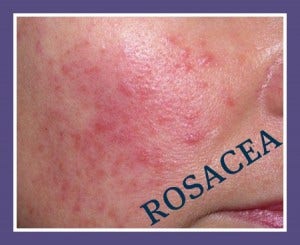
Fighting the Battle Called Rosacea
I had a friend ask me the other day if I had done any research on Rosacea (pronounced roh-ZAY-sha). She is in her early thirties, a mom of 4, a business owner and she suspects she has Rosacea. No one wants to develop skin problems at any age but when you are in the busiest season of your life, a skin issue is the last thing you want to deal with!
I had a friend ask me the other day if I had done any research on Rosacea (pronounced roh-ZAY-sha). She is in her early thirties, a mom of 4, a business owner and she suspects she has Rosacea. No one wants to develop skin problems at any age but when you are in the busiest season of your life, a skin issue is the last thing you want to deal with!
What is rosacea?
Rosacea is a kind of skin chronic inflammation in the skin (face). It occurs when the vessels swell and cause a flushed appearance. The more blood that flows through the vessels, the larger they grow in size. The become visible (broken capillaries and general redness). The more a person flushes (due to various reasons as described below), the more the veins stretch out. Eventually, they become permanently enlarged and won’t go away. (source)
Sadly, if she has indeed developed rosacea, it can not be cured (it is a chronic disorder) but it can be treated. Going to her doctor will be the best way to determine if she does have rosacea and how to properly treat it. (Communicating with a specialist is important as rosacea is often mistaken for acne. It is estimated to affect well over 16 million Americans, and most of them don’t know it!) Consult a dermatologist if you have any of the following symptoms:

- Redness on the cheeks, nose, chin or forehead.
- Small visible blood vessels on the face.
- Bumps or pimples on the face.
- Watery or irritated eyes.
- Facial burning, stinging and itching
Unfortunately for many rosacea sufferers, “it can cause significant psychological, social and occupational problems if left untreated. More than 76 percent of rosacea patients said their condition had lowered their self-confidence and self-esteem, and 41 percent reported that it had caused them to avoid public contact or cancel social engagements.” (source)
What triggers rosacea?
Many things can irritate rosacea! Some of the most common rosacea triggers include sun exposure, emotional stress, hot or cold weather, wind, alcohol, spicy foods, heavy exercise, hot baths, heated beverages and certain skin-care products.
How is rosacea treated?
It depends largely on what your symptoms and triggers are but here are some possible treatments:
- Exercise in early morning or evening when the temperature is cooler.
- Taking oral antibiotics may help due to their anti-inflammatory properties.
- When appropriate, laser treatment or other surgical procedures may be used to remove visible blood vessels or reduce extensive redness.
- For a more holistic approach, try Chrysanthellum Indicum Cream (to to strengthen capillaries), Green Tea Cream (to significantly reduce the number of red bumps and pustules), Digestive Enzymes (to aid in digestion of fatty acids) and Azelaic Acid Cream (to reduce the symptoms of dryness, burning, telangiectasia and itching). Other natural treatments have been found to work as well, depending on the symptoms.
- Work with a dermatologist to best determine which skin care products to use and which to avoid. A good rule of thumb is to avoid any products that burn, sting or irritate skin. Find gentle, natural products without unnecessary ingredients. Health food stores are great places to find natural, gentle and organic skin care.
- Finally, avoid trigger foods that can cause rosacea flare-ups! According to Dr. Jessica Wu, author of Feed Your Face (my new favorite book!), modifying your eating habits will reduce flare-ups and generally improve skin. Carefully read the list below to determine if something you are eating is triggering flare-ups in your skin!
Foods To Avoid When You Have Rosacea:
- Spicy foods- the number one food-related trigger of rosacea! Dr. Wu recommends if you love salsa, try a fruit based one instead! If you love chili powder in your food, substitute two parts cumin and one part oregano for a kick of flavor!
- Monosodium glutamate (MSG)- an addictive found in everything from potato chips to Chinese food to condiments like BBQ sauce and salad dressing. When label reading, watch out for “natural flavors” in the ingredients as there is a good chance MSG is hidden in there.
- Vinegar- found in many foods like potato chips, pickles, sushi rice and salad dressing. Substitute herb-infused olive oil for the traditional oil and vinegar combo!
- Cinnamon Oil- found in cinnamon gum, breath mints, toothpaste, mouthwash and even lip-plumping products!
- Large doses of B6 and B12 (20-40 times the recommended daily allowance). Check your multivitamin label but don’t eliminate them from your diet completely as they are needed for healthy brain function!
While rosacea is not fun to deal with, you can take steps to control it and minimize it. Knowledge is power so get busy researching, speaking with doctors, changing your diet and your habits (like taking hot showers!). Good luck
